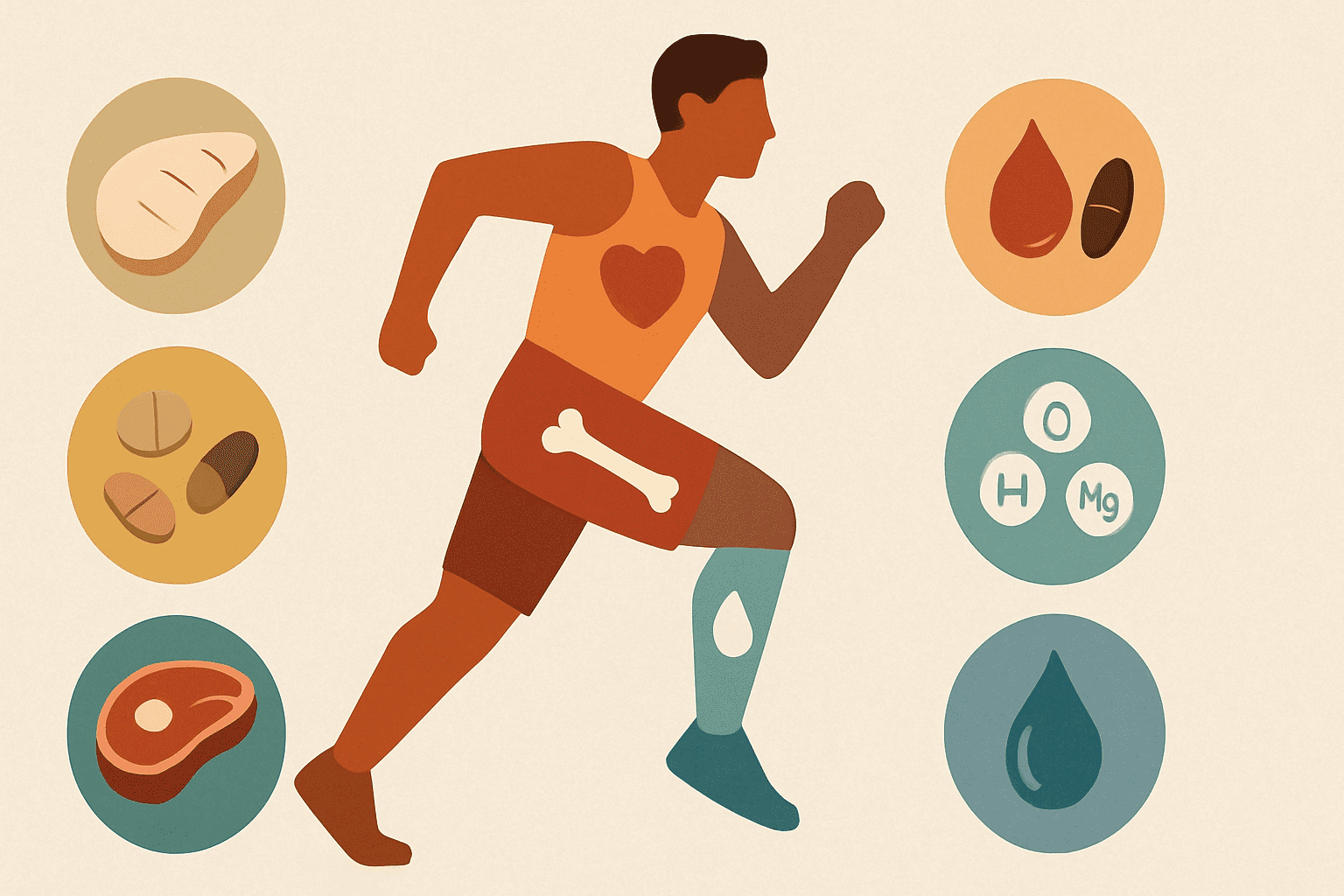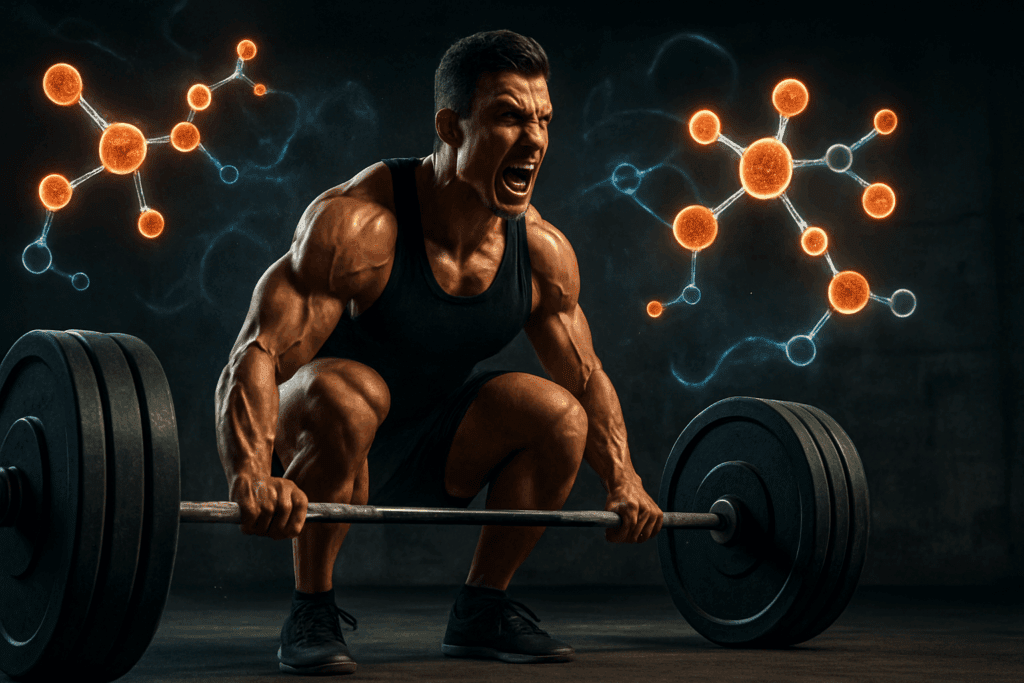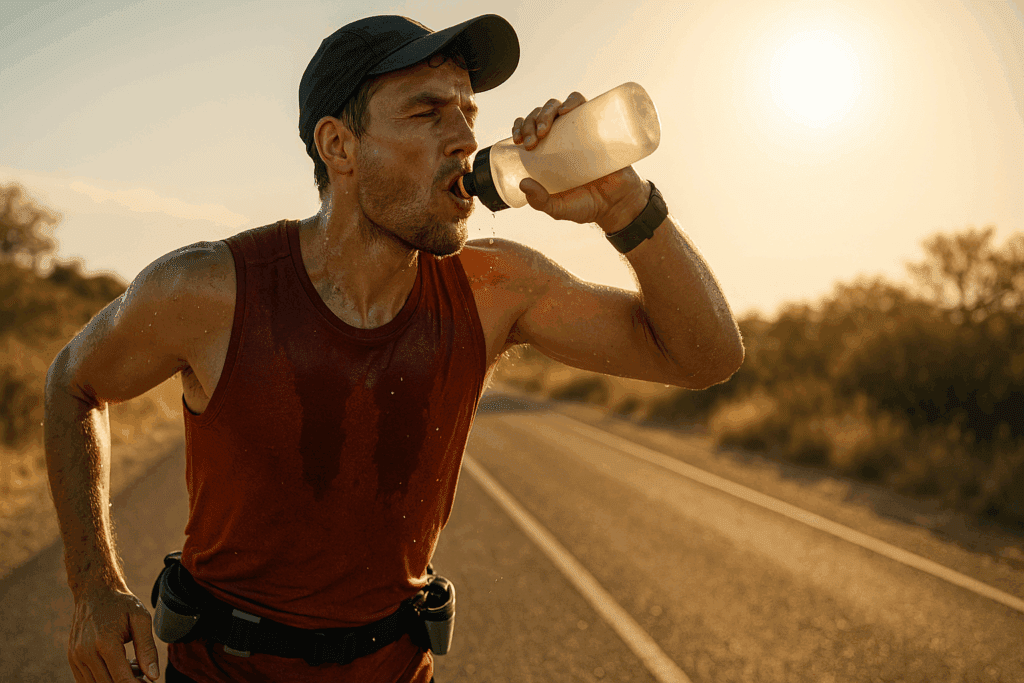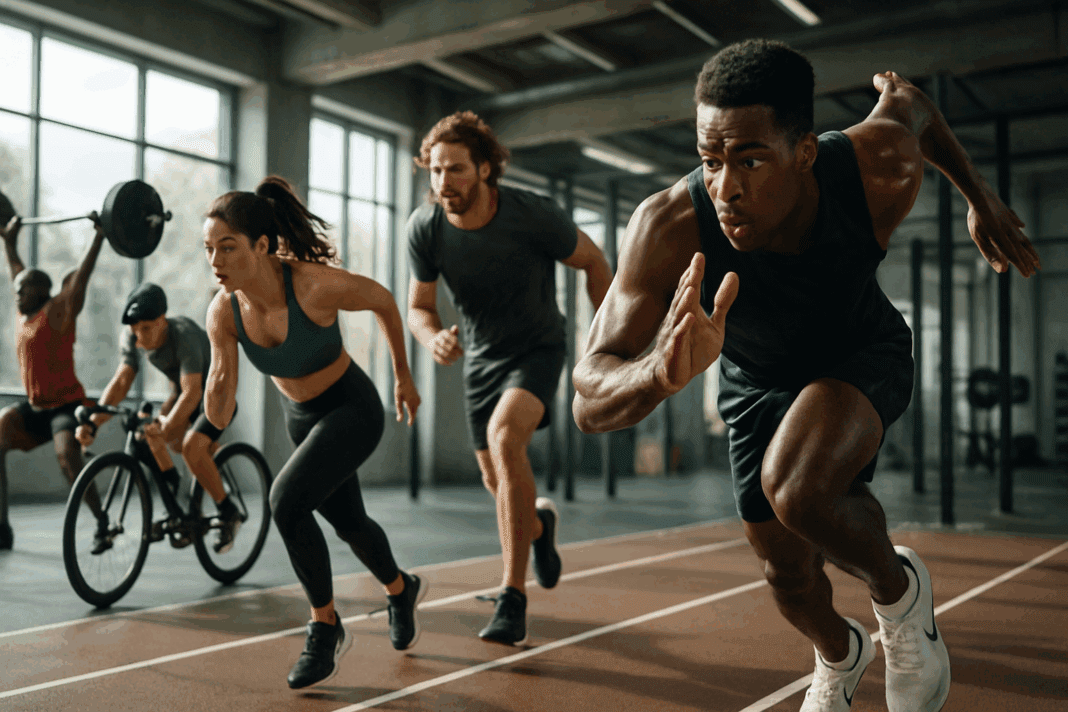The pursuit of peak physical performance is not just the realm of elite competitors; it’s a deeply personal journey for countless individuals striving to push their limits, build resilience, and achieve long-term health goals. Whether you’re a track sprinter, weekend warrior, or seasoned endurance athlete, your body demands more than just training—it requires strategic nutritional support tailored to intense physical output. With an overwhelming range of options on the market, finding the best supplements for athletes can be daunting. Yet emerging research continues to shine a light on how targeted supplementation can enhance performance, accelerate recovery, and protect long-term health. This article explores the top supplements for athletes and unpacks what science truly says about their role in boosting endurance, strength, and overall athletic performance naturally.
You may also like: Build Strength that Lasts: Best Supplements for Stamina and Endurance Backed by Science

Understanding the Nutritional Needs of Athletes
Athletes operate under a constant cycle of exertion and recovery, placing unique nutritional demands on the body. While a balanced diet is foundational, athletic performance often calls for higher concentrations of specific nutrients. These demands are particularly acute among those engaged in high-intensity or long-duration activities, which rapidly deplete glycogen stores, electrolytes, and essential micronutrients. In these contexts, food supplements for athletes serve as a bridge, compensating for deficiencies and supporting optimal performance.
Endurance athletes, for example, may require increased intake of B vitamins to facilitate energy production through aerobic pathways. Conversely, strength athletes might prioritize protein intake to stimulate muscle protein synthesis and reduce post-exercise muscle breakdown. The best supplements for sports are those that directly address these functional needs, with a focus on bioavailability and physiological compatibility. Supplements for athletes performance are not one-size-fits-all but are best chosen based on individual training intensity, recovery patterns, and dietary gaps.

Protein: The Foundation of Recovery and Muscle Building
When it comes to recovery and muscle development, protein remains an undisputed cornerstone. Adequate protein intake ensures the repair of microtears in muscle fibers, supports muscle hypertrophy, and sustains immune function during rigorous training blocks. Among the best supplements for athletes, protein powders derived from whey, casein, or plant-based sources such as pea or rice protein are commonly recommended.
Whey protein, in particular, has earned acclaim for its rapid absorption and rich leucine content, which plays a critical role in initiating muscle protein synthesis. For track athletes and sprinters who engage in frequent, high-intensity sessions, incorporating whey protein post-exercise has been linked to reduced markers of muscle damage and improved recovery times. Meanwhile, casein protein, with its slower digestion rate, can be particularly effective when taken before sleep to support overnight muscle repair.
For female athletes, who may face additional considerations around bone density and hormonal balance, choosing protein blends enriched with calcium and vitamin D may offer added benefits. The best supplements for female athletes often incorporate these supportive micronutrients, recognizing the intersection of performance and long-term health.
Creatine Monohydrate: Proven Power and Performance Enhancer
Creatine is one of the most researched and widely accepted performance-enhancing supplements in sports science. It functions by replenishing the body’s phosphocreatine stores, which are essential for short bursts of high-intensity effort. For sprinters, powerlifters, and track athletes, creatine supplementation translates to improved strength, power output, and muscular endurance.
Numerous randomized controlled trials have confirmed creatine’s efficacy, making it a mainstay in discussions around the best performance enhancing supplements. Importantly, creatine also supports cognitive function and cellular energy production, offering potential benefits beyond the gym or track. Common supplements for athletes often include creatine in a monohydrate form due to its proven bioavailability and safety profile.
There is a growing interest in creatine use among female athletes as well, with studies indicating enhanced muscle strength and improved anaerobic performance without adverse effects on body composition. Thus, for athletes seeking a reliable boost in short-duration, high-intensity events, creatine remains one of the top supplements for athletes in terms of efficacy and cost-effectiveness.

Branched-Chain Amino Acids (BCAAs): Combating Fatigue and Preserving Muscle Mass
BCAAs—leucine, isoleucine, and valine—are essential amino acids that play a vital role in muscle metabolism. They are particularly beneficial during extended endurance sessions or caloric deficits, where muscle breakdown may occur. Supplements for track athletes often feature BCAAs to maintain lean muscle mass and reduce perceived exertion during intense training.
Scientific literature supports BCAA supplementation as a strategy to reduce muscle soreness, preserve glycogen stores, and limit muscle catabolism. For endurance runners and cyclists, BCAAs may contribute to delayed onset of central fatigue by affecting tryptophan transport and serotonin production in the brain. This makes them particularly appealing for those engaged in back-to-back training sessions.
For both male and female athletes, the inclusion of BCAAs in training regimens can be a practical approach to improving training consistency and recovery. While not a standalone solution, BCAAs represent one of the good supplements for athletes who need metabolic support without additional caloric intake.

Omega-3 Fatty Acids: Anti-Inflammatory and Cardiovascular Support
The role of omega-3 fatty acids in supporting cardiovascular health is well-established, but their significance for athletes extends even further. Omega-3s, particularly EPA and DHA, have potent anti-inflammatory properties that aid in recovery, joint health, and even mood stabilization. Athletes often experience systemic inflammation as a result of intensive training, which can impair recovery and increase injury risk if not adequately managed.
Integrating omega-3s through fish oil or algae-based supplements has been shown to reduce muscle soreness, lower oxidative stress, and improve aerobic capacity. For those wondering what vitamins should athletes take beyond the basics, omega-3s stand out as both a protective and performance-enhancing agent. They are especially beneficial for older athletes or those managing chronic joint issues, offering a non-pharmacologic route to sustained movement and resilience.
Omega-3s are also frequently included in the best supplements for male athletes due to their supportive role in testosterone regulation and cardiovascular endurance. This crossover benefit underscores their inclusion in the top supplements for athletes across disciplines.
Electrolytes and Hydration Strategies: Beyond Water
Proper hydration extends far beyond water intake. For athletes engaged in prolonged or high-intensity exercise, especially in hot environments, replenishing lost electrolytes is essential to maintaining neuromuscular function and preventing cramps. Sodium, potassium, magnesium, and calcium are among the key electrolytes lost in sweat, and their imbalance can lead to fatigue, dizziness, and impaired performance.
Electrolyte supplements and hydration powders are among the most recommended supplements for athletes, especially those in endurance and stamina training. These products not only replenish vital minerals but also improve fluid absorption and retention. For track sprinters or marathon runners, timely electrolyte intake can be the difference between finishing strong and hitting the wall.
Sports performance supplements that contain a balanced electrolyte profile are especially helpful for female athletes, who may have different sweat rates and hormonal considerations. Good vitamins for athletes in this context often include magnesium and vitamin B6, which aid in muscle function and prevent cramping.

Multivitamins and Micronutrients: Filling the Gaps
Even the most disciplined dietary regimen can fall short in delivering all essential micronutrients required for optimal performance. Factors such as soil depletion, food processing, and individual absorption rates can result in subclinical deficiencies that impair energy production and immune function. Multivitamins tailored to athletic needs represent a strategic safeguard against these gaps.
The best vitamins for exercise typically include B-complex vitamins, which facilitate energy metabolism; vitamin D, crucial for bone health and hormonal regulation; and antioxidants like vitamin C and E to combat oxidative stress. Top vitamins for athletes go beyond generic formulations, incorporating bioavailable forms such as methylated B12 and D3 to ensure effective absorption.
For female athletes, iron, folate, and magnesium may be of particular interest, especially during periods of hormonal fluctuation or heavy training cycles. For male athletes, zinc and selenium support testosterone balance and cellular repair. These individualized considerations underscore the importance of choosing food supplements for athletes that align with their physiological profile and performance goals.
Adaptogens and Herbal Supplements: Supporting Stress and Recovery
Adaptogenic herbs such as ashwagandha, Rhodiola rosea, and cordyceps are increasingly recognized for their ability to support physical performance through hormonal balance and improved resilience. These natural compounds work by modulating the body’s stress response, enhancing endurance, and improving oxygen utilization.
Research into cordyceps, for instance, has demonstrated increased VO2 max and time-to-exhaustion in trained athletes, suggesting a tangible improvement in aerobic performance. Similarly, Rhodiola has been linked to reduced perceived exertion and improved focus during high-pressure training. These properties make them appealing additions to the best supplements for athletic performance, especially for those navigating high-stress environments or overtraining risk.
The best supplements for sprinters and track athletes often incorporate these adaptogens for their unique ability to improve recovery while maintaining high output. While more research is needed to standardize dosage and efficacy, early findings suggest that herbal supplements offer promising adjunctive benefits for athletes seeking holistic support.
Carbohydrate Supplements and Glycogen Replenishment
Carbohydrates are the primary fuel source for high-intensity and endurance efforts, making glycogen replenishment a key post-exercise strategy. While whole food sources should form the bulk of carbohydrate intake, fast-absorbing carb supplements like maltodextrin or dextrose offer a practical solution during extended training or competition.
These carbohydrate supplements are among the best sports performance supplements when it comes to sustaining effort and accelerating recovery. By rapidly restoring muscle glycogen stores, they enable more frequent and intense training sessions without compounding fatigue. For track sprinters, intra-workout carbohydrate intake can help maintain explosive power across multiple sprints.
For both male and female athletes, carbohydrate timing and form play a significant role in performance outcomes. Coupling these supplements with electrolytes or BCAAs can enhance their effectiveness, making them an integral part of performance-oriented supplementation strategies.

Caffeine and Nootropics: Enhancing Focus and Mental Performance
Caffeine has long been recognized for its ergogenic benefits, including enhanced alertness, improved pain tolerance, and increased stamina. When used strategically, caffeine can help delay fatigue, especially during endurance events. It also functions as a nootropic, enhancing cognitive focus and reaction time—both critical for competitive performance.
Sports performance supplements often include caffeine in precise dosages to support both mental and physical output. The best supplements for track athletes, particularly sprinters and middle-distance runners, frequently combine caffeine with other nootropics like L-theanine or tyrosine to reduce jitters and sustain attention under pressure.
While caffeine’s effects are well-documented, tolerance can build over time, and individual sensitivity varies. Therefore, personalized strategies that consider timing, dosage, and performance goals are essential for maximizing its benefits without unwanted side effects. As always, sourcing clean and third-party tested products remains a best practice for maintaining safety and compliance.
Choosing the Right Supplement Strategy for Your Athletic Profile
Navigating the supplement landscape requires a combination of self-awareness, scientific literacy, and professional guidance. The best supplements for track sprinters may differ from those needed by endurance athletes or strength-focused individuals. Considerations such as body composition goals, hormonal health, dietary restrictions, and training frequency all influence the ideal supplement protocol.
Athletes are encouraged to work with registered dietitians or sports nutritionists to assess their specific needs and avoid unnecessary or redundant supplementation. Good supplements for athletes are those that complement a whole-food diet, address identifiable gaps, and are backed by clinical research. With countless formulations and brands available, prioritizing quality—through certifications, transparency, and scientific backing—is essential.
Ultimately, the top supplements for athletes are those that align with both short-term performance goals and long-term wellness. They should enhance energy availability, support efficient recovery, and minimize injury risk without disrupting the body’s natural balance. By treating supplementation as a strategic component of training rather than a shortcut or cure-all, athletes can harness their full potential with clarity and confidence.
Frequently Asked Questions: Top Supplements for Athletes
What factors should athletes consider before choosing a supplement regimen? Before deciding on any sports supplementation strategy, athletes should assess their training demands, nutritional intake, recovery needs, and even genetic predispositions. For example, an athlete with a high training volume may require different micronutrients than someone focused on explosive power. Additionally, lifestyle elements like sleep, stress, and pre-existing conditions should be factored into decisions around supplementation. Working with a qualified sports nutritionist can help tailor supplement plans using data from blood tests, dietary logs, and performance tracking. This level of personalization is essential to identifying the best supplements for athletic performance that will work in harmony with the athlete’s physiology and goals.
Are there gender-specific considerations when choosing supplements? Yes, gender plays a notable role in supplement selection. The best supplements for male athletes often emphasize testosterone support, creatine metabolism, and cardiovascular resilience. Meanwhile, the best supplements for female athletes may prioritize bone density, iron levels, and hormonal balance. Because metabolic rates, hormone fluctuations, and even sweat composition can differ, gender-specific formulations help target these variations. Understanding these distinctions ensures that food supplements for athletes are not just effective, but safe and supportive across diverse body chemistries.
How can athletes determine the quality of supplements on the market? With the rise in sports performance supplements, it’s crucial to scrutinize sourcing, certifications, and ingredient transparency. Athletes should look for third-party verification such as NSF Certified for Sport or Informed-Sport labels to ensure purity and absence of banned substances. The best supplements for athletes go beyond marketing claims and demonstrate bioavailability, evidence-based formulations, and clear labeling. Avoiding proprietary blends without disclosed dosages is another good practice. Ultimately, recommended supplements for athletes are those that prioritize scientific rigor and consumer safety.
Can timing impact the effectiveness of supplements? Absolutely. When you take your supplements can be as important as what you take. For instance, protein timing within 30 minutes post-exercise is critical for muscle synthesis, while the best vitamins for exercise like B-complex and magnesium can be more effective when consumed with meals for better absorption. Creatine is often most effective when taken pre- or post-workout alongside carbohydrates to enhance uptake. Strategic timing makes good supplements for athletes even more impactful, reducing waste and maximizing benefits. Educated timing also reduces gastrointestinal discomfort, a common barrier to supplement adherence.
Are multivitamins still relevant if an athlete eats a well-rounded diet? While whole foods should be the foundation of any athlete’s nutrition plan, even clean eating can leave gaps. Soil depletion, food transportation, and individual absorption issues can diminish nutrient density. In this context, top vitamins for athletes—particularly those designed with enhanced bioavailability—help close the gap. The best vitamins for sports go beyond basic RDA values, tailoring dosages to the increased demands of rigorous physical activity. For athletes in high-stress or travel-heavy environments, a well-formulated multivitamin remains a pragmatic solution.
How do supplements support recovery and reduce injury risk? Supplements for athletes performance do more than boost output; they play a key role in minimizing inflammation, supporting joint health, and accelerating tissue repair. Omega-3 fatty acids, curcumin, and collagen peptides have all shown promise in supporting post-training recovery. These components are often included in the best performance enhancing supplements for their ability to enhance longevity in sport. Athletes who neglect recovery-focused supplementation may face higher rates of overtraining, burnout, or soft-tissue injuries. By contrast, consistent use of recovery-supportive nutrients helps maintain training volume without compromising wellness.
Are there unique supplementation strategies for track athletes and sprinters? Yes, the energy systems required for explosive power are vastly different from those needed in endurance sports. The best supplements for track athletes and the best supplements for sprinters often focus on ATP regeneration, muscle buffering capacity, and neural recovery. Beta-alanine, for instance, helps delay muscle fatigue, while L-citrulline can improve nitric oxide production and sprint performance. Supplements for track athletes also tend to include nootropics to support reaction time and neuromuscular coordination. While all athletes benefit from a nutrient-dense foundation, sprinters require specialized compounds to meet their rapid burst demands.
How can athletes avoid dependency or overuse of supplements? One of the more nuanced aspects of using sports performance supplements is striking a balance between supplementation and self-sufficiency. Periodization strategies—cycling supplements during off-seasons or recovery weeks—can help prevent dependency. Good vitamins for athletes should enhance, not replace, the benefits of a well-designed nutrition and training plan. Athletes should also regularly reassess their supplement stack based on changing goals, age, and performance feedback. Avoiding overuse is especially critical with stimulants and hormone-related compounds, which can disrupt natural regulation if misused.
What role do emerging supplements play in modern athletic programs? Innovations in nutraceuticals and bioactive peptides are expanding what’s possible in athlete supplementation. Compounds like nicotinamide riboside (NR) for mitochondrial health, or adaptogenic blends that regulate cortisol, are being explored in high-performance labs. While not yet as mainstream as the best sports performance supplements, these cutting-edge options show potential for supporting both performance and recovery. Top supplements for athletes may soon include genetically tailored formulations and microbiome-specific compounds. As this field evolves, the emphasis remains on evidence-based innovation rather than trends.
How can younger or collegiate athletes responsibly incorporate supplements? Younger athletes, particularly those in high school or early college, should approach supplements with caution and guidance. Rather than chasing the strongest products on the market, the focus should be on foundational needs like hydration, protein, and the best vitamins for sports recovery. Coaches and athletic trainers play a vital role in steering students toward age-appropriate, safe options. The best supplements for sports at this stage prioritize growth, energy balance, and injury prevention without disrupting natural development. Establishing good habits early—such as reading labels, avoiding banned substances, and using supplements as tools rather than crutches—builds long-term health literacy in future athletes.
Conclusion: Elevating Athletic Performance with Science-Backed Supplementation
In the complex and demanding world of athletic performance, supplements offer targeted, evidence-based support to help athletes reach their full potential. From protein and creatine to omega-3s and adaptogens, each supplement discussed plays a specific, research-backed role in supporting energy, endurance, strength, and recovery. The best supplements for athletes are not just performance enhancers—they are tools for resilience, health, and sustained excellence.
As athletes navigate intense physical demands, understanding what vitamins should athletes take becomes central to their strategy. Selecting the best supplements for sports goes beyond marketing claims; it requires alignment with scientific evidence, personal needs, and performance goals. Whether exploring the best supplements for male athletes, discovering good vitamins for athletes across genders, or evaluating the best supplements for track athletes and sprinters, one thing remains clear: intelligent, informed supplementation can be a game-changer.
In a landscape crowded with options, the value lies in choosing wisely, using consistently, and measuring outcomes thoughtfully. With a foundation rooted in experience, expertise, and science, athletes can optimize their journey not just for medals, but for mastery of their own physical and mental potential.
Was this article helpful? Don’t let it stop with you. Share it right now with someone who needs to see it—whether it’s a friend, a colleague, or your whole network. And if staying ahead on this topic matters to you, subscribe to this publication for the most up-to-date information. You’ll get the latest insights delivered straight to you—no searching, no missing out.
Further Reading:
Your Guide to the Best Supplements for Muscle Growth

